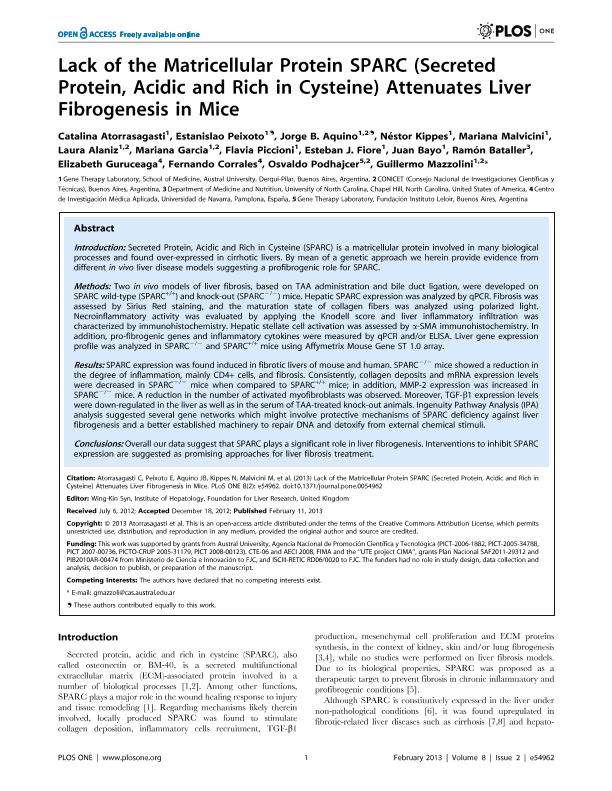Artículo
Lack of the Matricellular Protein SPARC (Secreted Protein, Acidic and Rich in Cysteine) Attenuates Liver Fibrogenesis in Mice
Atorrasagasti, Maria Catalina ; Peixoto, Estanislao; Aquino, Jorge Benjamin
; Peixoto, Estanislao; Aquino, Jorge Benjamin ; Kippes, Néstor Fabián; Malvicini, Mariana
; Kippes, Néstor Fabián; Malvicini, Mariana ; Alaniz, Laura Daniela
; Alaniz, Laura Daniela ; Garcia, Mariana Gabriela
; Garcia, Mariana Gabriela ; Piccioni, Flavia Valeria
; Piccioni, Flavia Valeria ; Fiore, Esteban Juan; Bayo, Juan; Bataller, Ramón; Guruceaga, Elizabeth; Corrales, Fernando; Podhajcer, Osvaldo Luis
; Fiore, Esteban Juan; Bayo, Juan; Bataller, Ramón; Guruceaga, Elizabeth; Corrales, Fernando; Podhajcer, Osvaldo Luis ; Mazzolini Rizzo, Guillermo Daniel
; Mazzolini Rizzo, Guillermo Daniel
 ; Peixoto, Estanislao; Aquino, Jorge Benjamin
; Peixoto, Estanislao; Aquino, Jorge Benjamin ; Kippes, Néstor Fabián; Malvicini, Mariana
; Kippes, Néstor Fabián; Malvicini, Mariana ; Alaniz, Laura Daniela
; Alaniz, Laura Daniela ; Garcia, Mariana Gabriela
; Garcia, Mariana Gabriela ; Piccioni, Flavia Valeria
; Piccioni, Flavia Valeria ; Fiore, Esteban Juan; Bayo, Juan; Bataller, Ramón; Guruceaga, Elizabeth; Corrales, Fernando; Podhajcer, Osvaldo Luis
; Fiore, Esteban Juan; Bayo, Juan; Bataller, Ramón; Guruceaga, Elizabeth; Corrales, Fernando; Podhajcer, Osvaldo Luis ; Mazzolini Rizzo, Guillermo Daniel
; Mazzolini Rizzo, Guillermo Daniel
Fecha de publicación:
02/2013
Editorial:
Public Library of Science
Revista:
Plos One
ISSN:
1932-6203
Idioma:
Inglés
Tipo de recurso:
Artículo publicado
Clasificación temática:
Resumen
Introduction
Secreted Protein, Acidic and Rich in Cysteine (SPARC) is a matricellular protein involved in many biological processes and found over-expressed in cirrhotic livers. By mean of a genetic approach we herein provide evidence from different in vivo liver disease models suggesting a profibrogenic role for SPARC.
Methods
Two in vivo models of liver fibrosis, based on TAA administration and bile duct ligation, were developed on SPARC wild-type (SPARC+/+) and knock-out (SPARC−/−) mice. Hepatic SPARC expression was analyzed by qPCR. Fibrosis was assessed by Sirius Red staining, and the maturation state of collagen fibers was analyzed using polarized light. Necroinflammatory activity was evaluated by applying the Knodell score and liver inflammatory infiltration was characterized by immunohistochemistry. Hepatic stellate cell activation was assessed by α-SMA immunohistochemistry. In addition, pro-fibrogenic genes and inflammatory cytokines were measured by qPCR and/or ELISA. Liver gene expression profile was analyzed in SPARC−/− and SPARC+/+ mice using Affymetrix Mouse Gene ST 1.0 array.
Results
SPARC expression was found induced in fibrotic livers of mouse and human. SPARC−/− mice showed a reduction in the degree of inflammation, mainly CD4+ cells, and fibrosis. Consistently, collagen deposits and mRNA expression levels were decreased in SPARC−/− mice when compared to SPARC+/+ mice; in addition, MMP-2 expression was increased in SPARC−/− mice. A reduction in the number of activated myofibroblasts was observed. Moreover, TGF-β1 expression levels were down-regulated in the liver as well as in the serum of TAA-treated knock-out animals. Ingenuity Pathway Analysis (IPA) analysis suggested several gene networks which might involve protective mechanisms of SPARC deficiency against liver fibrogenesis and a better established machinery to repair DNA and detoxify from external chemical stimuli.
Conclusions
Overall our data suggest that SPARC plays a significant role in liver fibrogenesis. Interventions to inhibit SPARC expression are suggested as promising approaches for liver fibrosis treatment.
Palabras clave:
Sparc
,
Collagen
,
Tgfb1
,
Inflammation
,
Liver Chirrosis
,
Microarray
Archivos asociados
Licencia
Identificadores
Colecciones
Articulos(IIBBA)
Articulos de INST.DE INVEST.BIOQUIMICAS DE BS.AS(I)
Articulos de INST.DE INVEST.BIOQUIMICAS DE BS.AS(I)
Citación
Atorrasagasti, Maria Catalina; Peixoto, Estanislao; Aquino, Jorge Benjamin; Kippes, Néstor Fabián; Malvicini, Mariana; et al.; Lack of the Matricellular Protein SPARC (Secreted Protein, Acidic and Rich in Cysteine) Attenuates Liver Fibrogenesis in Mice; Public Library of Science; Plos One; 8; 2; 2-2013; e54962-e54962
Compartir
Altmétricas



